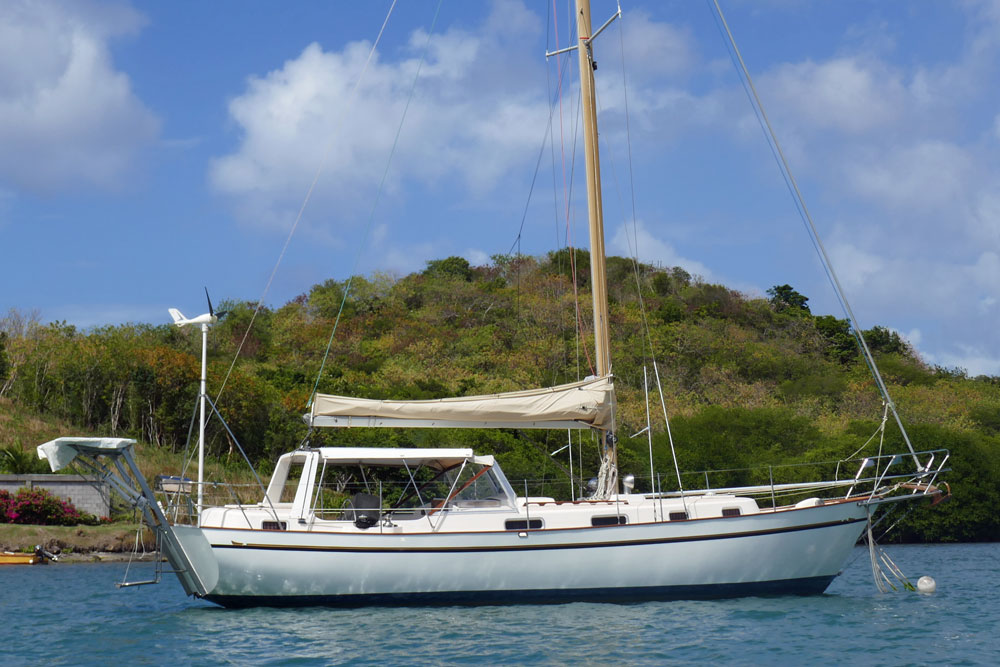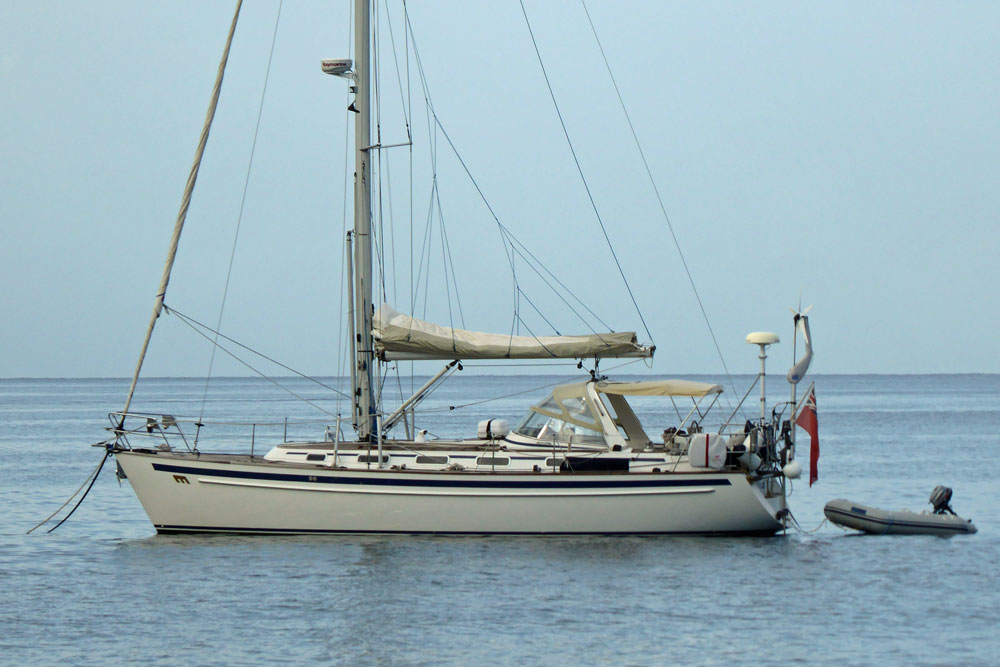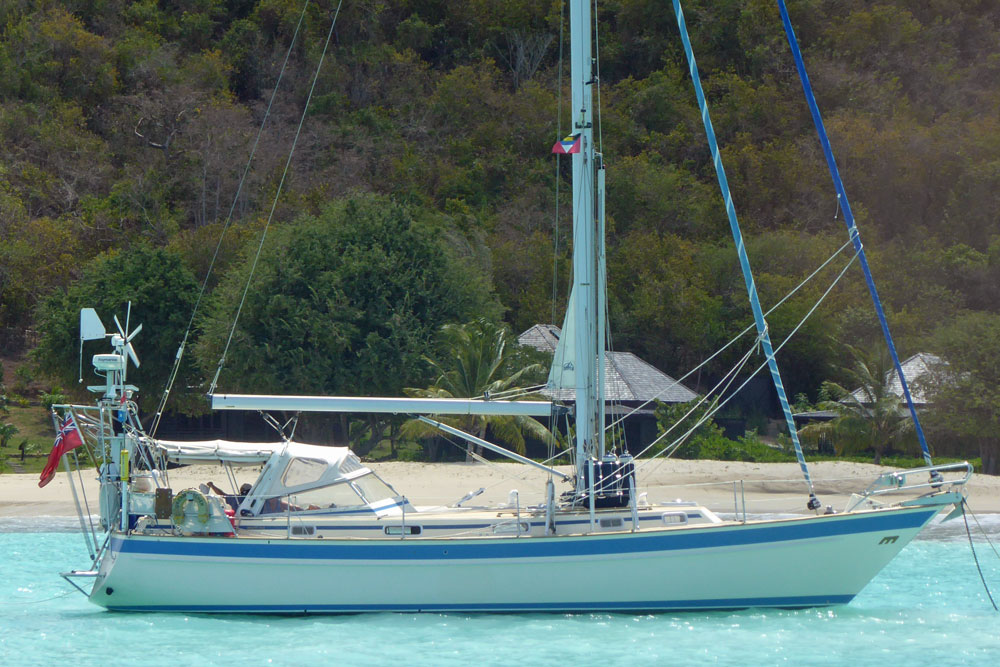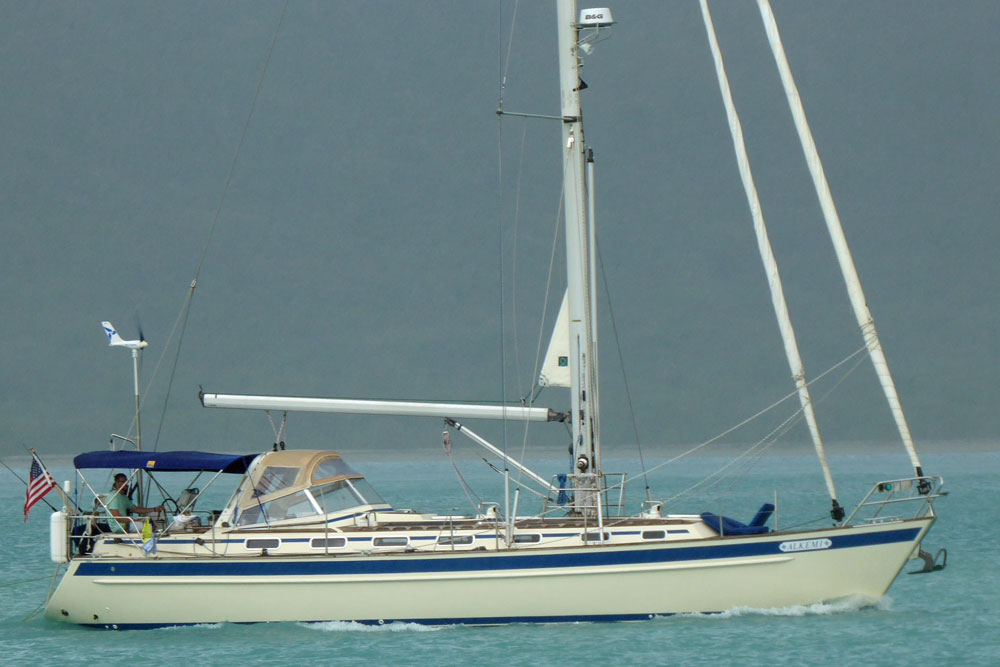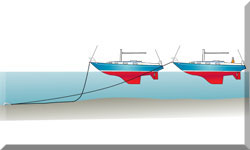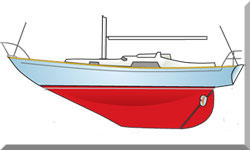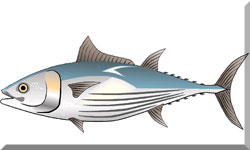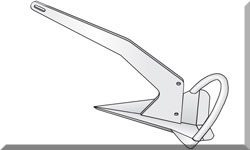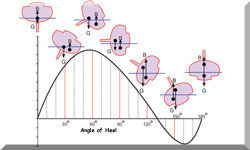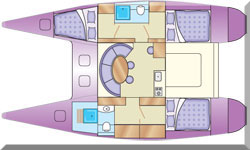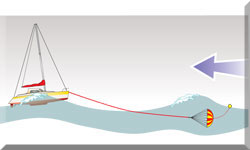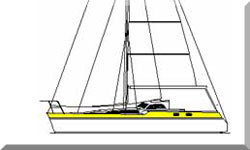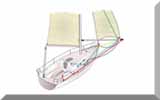- Home
- Cruising Yachts 35' to 40'
- Malo 50
The Malo 50 Sailboat
The Malo 50, a centre-cockpit cruising boat, was designed by Olsoners Batbyggen and built in Sweden by Malo Yachts.
Published Specification for the Malo 50
Underwater Profile: Long Fin with Skeg-Hung Rudder
Hull Material: GRP
Length Overall: 36'5" (11.1m)
Waterline Length: 29'5" (9.0m)
Beam: 11'0" (3.4m)
Draft: 4'5" (1.4m)
Rig Type: Masthead sloop (also available as ketch)
Displacement: 15,873lb (7,200kg)
Designer: Olsoners Batbyggen
Builder: Malo yachts (Sweden)
Year First Built: 1969
Year Last Built: 1980
Number Built: 140
Published Design Ratios for the Malo 50
1. Sail Area/Displacement Ratio: 15.9
- Less than 16 would be considered under-powered;
- 16 to 20 would indicate reasonably good performance;
- Over 20 suggests relatively high performance.
2. Ballast/Displacement Ratio: 44.5
- Under 40: less stiff, less powerful
- Over 40: stiffer, more powerful
3. Displacement/Length Ratio: 275
- Under 100: Ultralight
- 100 to 200: Light
- 200 to 275: Moderate
- 275 to 350: Heavy
- Over 350: Ultraheavy
4. Comfort Ratio: 31.9
- Under 20 indicates a lightweight racing boat
- 20 to 30 indicates a coastal cruiser
- 30 to 40 indicates a moderate offshore cruising boat
- 40 to 50 indicates a heavy offshore boat
- Over 50 indicates an extremely heavy offshore boat
5. Capsize Screening Formula: 1.8
- Under 2.0 (the lower the better): Better suited for ocean passages
- Over 2.0: Less suited for ocean passages
read more about these all-revealing numbers...
Summary Analysis of the Design Ratios for the Malo 50
1. A Sail Area/Displacement Ratio of 15.9 suggests that the Malo 50 will need a stiff breeze to get her going. In light conditions, unless you've got plenty of time on your hands, motor-sailing may be the way to go.
2. A Ballast/Displacement Ratio of 44.5 means that the Malo 50 will stand up well to her canvas in a blow, helping her to power through the waves.
3. A Displacement/Length Ratio of 275, tells us the Malo 50 is a moderate-to-heavy displacement cruiser, which means she'll carry a reasonable amount of cruising gear without it having a dramatic effect on her performance. Many of today's sailboats intended for offshore cruising fall into this displacement category.
4. Ted Brewer's Comfort Ratio of 31.9 suggests that crew comfort of a xxxx in a seaway is similar to what you would associate with the motion of a moderate bluewater cruising boat - a predictable and acceptable motion for most seasoned sailors.
5. The Capsize Screening Formula (CSF) of 1.8 tells us that a Malo 50 would be a safer choice of sailboat for an ocean passage than one with a CSF of more than 2.0.
The Malo 50: A Classic Swedish Cruising Sailboat
The Malo 50 has a spacious interior with plenty of woodwork and natural light. It can accommodate up to six people in three cabins: a forward cabin with a V-berth, a main cabin with two settees that can convert into single berths, and an aft cabin with a double berth. The boat also has a galley with a stove, an oven, a sink and a refrigerator, a navigation station with a chart table and instruments, and two heads with showers.
Pros of the Malo 50
- Quality: The Malo 50 is built with high standards of craftsmanship and materials by Malo Yachts, a famous Swedish shipyard that has been making sailboats since 1939. The boat has a strong fiberglass hull, stainless steel fittings, teak decks and mahogany interiors.
- Comfort: The Malo 50 has a comfortable motion at sea under sail, thanks to its long keel and heavy displacement. It also has a roomy interior with ample headroom, storage space and ventilation. The boat is well insulated and heated for cold climates.
- Performance: The Malo 50 is not a racing boat, but it can sail well in most conditions. It has a moderate sail area that gives it enough power in light winds, but not too much in strong winds. It also has a good hull shape that allows it to point high and tack easily. The boat can reach speeds of up to 7 knots under sail.
- Versatility: The Malo 50 is suitable for different types of sailing, from inshore cruising to offshore passages to ocean voyages. It has a seaworthy design that can handle rough weather and waves. It also has a shallow draft that allows it to access shallow waters and anchorages.
Cons of the Malo 50
The Malo 50 is not without its drawbacks however, some of which are:
- Maneuverability: The Malo 50 is not an easy boat to maneuver in tight spaces or marinas. It has a long keel that makes it less responsive to steering inputs and more prone to leeway. It also has a large turning radius that requires more room to turn around.
- Weight: The Malo 50 is a heavy boat that can be reluctant to accelerate or stop. It also has more inertia and momentum that can make it harder to control in gusty winds or waves. The boat may need help from the engine in very light winds or when sailing upwind.
The above text was drafted by sailboat-cruising.com using GPT-4 (OpenAI’s large-scale language-generation model) as a research assistant to develop source material; we believe it to be accurate to the best of our knowledge.
Other sailboats in the Malo range include:
Recent Articles
-
Is Marine SSB Still Used?
Apr 15, 25 02:05 PM
You'll find the answer to this and other marine SSB-related questions right here... -
Is An SSB Marine Radio Installation Worth Having on Your Sailboat?
Apr 14, 25 02:31 PM
SSB marine radio is expensive to buy and install, but remains the bluewater sailors' favourite means of long-range communication, and here's why -
Correct VHF Radio Procedure: Your Questions Answered
Apr 14, 25 08:37 AM
Got a question about correct VHF radio procedure? Odds are you'll find your answer here...
